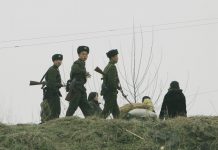Some rural areas of South Hamgyong Province have recently experienced severe food shortages. With little sign of improvement, people are even taking their own lives.
“More and more families are collapsing from hunger as food disappears in rural counties such as Yonggang County and Hongwon County,” a source in South Hamgyong Province told Daily NK on Monday, speaking on condition of anonymity for security reasons. “This is causing growing insecurity among the people about a possible food crisis.”
According to the source, the worsening food shortage has led to a number of deaths in some rural counties in South Hamgyong Province.
For example, a family of four in Yonggwang County died early last month, and their bodies were discovered several days later.
The father had tuberculosis and the 8-year-old youngest son was bedridden from malnutrition, but the family had no money for treatment. In addition, the family had run out of food a month before their deaths, so they begged their neighbors for food. But they could not get a gram of rice.
Deeply in debt from buying on credit, the family could not borrow money to buy food. With no way to resolve their food situation, the family – unable to bear the pain any longer – took their own lives together, the source said.
“The food supply in every rural home in North Korea has now reached its lowest point,” the source said. “People hardly have any food of their own, so they can’t help others. So food-poor families can’t get help even if they beg for rice.”
“I find no joy in living anymore”
A couple was also found dead early last month in a farming community in Hongwon County.
The husband used to collect shellfish from the sea, but had been unable to work for several years after injuring his leg, which quickly left the couple in dire financial straits. The wife earned some money while caring for her husband, keeping the family barely afloat. But with food becoming increasingly scarce, the couple finally decided to end their lives.
In a rural village in Bukchong County, a man in his 60s died by suicide in the middle of last month.
The man lived with his son’s family, but the entire household had been struggling with food shortages for several years. A week after his wife’s death, he killed himself after leaving a note saying, “I find no joy in living anymore. On the contrary, it would help to die quickly.”
The deaths heighten the sense of insecurity felt by residents of agricultural villages over food shortages and darken the social atmosphere, the source said.
“With many families in rural areas suffering from food shortages even before the barley hump, people are facing a greater threat to their livelihood than ever before,” he said. “Despite the situation, the state simply repeats the phrase ‘self-reliance’ instead of taking action. And in the current reality, self-reliance means telling survivors to fend for themselves and people who will die to die.”
Translated by David Black. Edited by Robert Lauler.
Daily NK works with a network of sources living in North Korea, China, and elsewhere. Their identities remain anonymous for security reasons. For more information about Daily NK’s network of reporting partners and information-gathering activities, please visit our FAQ page here.
Please send any comments or questions about this article to dailynkenglish@uni-media.net.


















